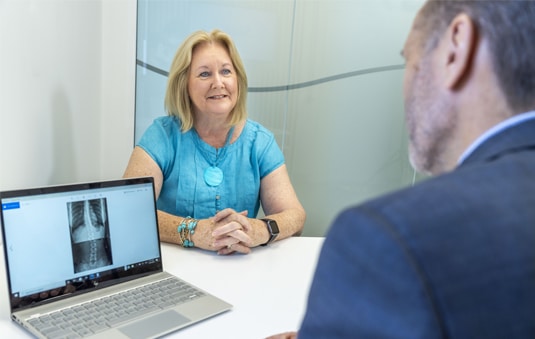Supporting Your Loved Ones
Family, friends and carers play an important role.
A diagnosis of scoliosis or hyperkyphosis can come as a shock to a patient, but it will also have impacts on their friends and family. It can sometimes be hard for those loved ones to know how to provide appropriate emotional care and support.
The treatment journey requires commitment and effort not only from the patient, but from their supporter networks. Carers, friends and family provide the essential emotional support to help a patient get through their treatment.
We’ve put together some ways for friends and family members to understand how they can provide the best support possible.
Understand the Condition
It’s important for friends and family members to understand the realities of the diagnosis. It can be tempting to search online, or listen to other’s feedback, but being properly informed and focussing on an individuals case, can help a great deal.
A patient’s Clinician and Rehabilitation Therapist are the best source of information, and any questions can be raised at routine appointments or sent through to our team in between these times.


Communication
Being better informed about scoliosis and hyperkyphosis can help friends and family improve their ability to communicate about it respectfully and positively.
Encourage patients to talk about their experience and feelings. Sometimes in the beginning it can be helpful to talk to a trusted friend rather than family members. Often, emotions get in the way of common-sense advice, and it can be good to have an impartial person to offer insights.
Empathy & Compassion
Those close to a patient can help just by taking some time to think about what it must be like to live with the condition. It’s important to remember that each patient is more than just their scoliosis or hyperkyphosis, even though it may be dominating their lives for a period.
The treatment journey can be a challenge, and family members and friends can provide the best possible support simply by accepting their loved one as they are and helping them when asked.

Nora-Lee, Patient
Some Practical Ways to Help and Support
It may be that your child or loved one now needs to wear a brace for a certain amount of time each, or complete an ‘at home’ exercise program each day. Here are some practical ways you can try to help make life that little bit easier.

Sleeping
If full time brace wear is required, you can discuss sleeping positions with them and help them find the most comfortable sleeping position with their bed, pillow and brace.
Staying Accountable
Be a support person to help keep the exercise program on track each day. You could even do the exercises with them.

Shopping
Beginning to wear a brace can mean adjustments in clothes. A visit to the shops for some new 'brace friendly' clothes and accessories can help make the experience more positive.
Physical Activity
Incorporating regular physical activity can have a significant positive impact on both physical and mental well-being. Encourage patients to continue with their favourite sports and activities. You could even do them too!
Interests & Hobbies
Engaging in hobbies can provide a much-needed break, allowing patients to focus on something positive and enjoyable. Encourage patients to prioritise time for hobbies and interests to help bring joy and fulfillment. You might even like to start something new with them.
Listening
Listening can help family members and friends understand the physical and emotional impact on their loved one. It can help also help them provide the necessary support, such as offering a helping hand with daily activities or just being there to listen when needed.
Hear from some patients and their families about navigating through their journeys
Frequently Asked Questions from Carers, Friends and Family Members
What are some ways I can support my child or friend who has started treatment?
Encouragement goes a long way in supporting patients moving through their treatment.
This is not only encouragement for wearing their brace or completing their rehabiliation program, but also encouragement to:
- Continue to take part in sport and other physical activites and stay fit and healthy
- Still pursue their interests and hobbies, encouraging them to make time for these
- Talk to friends, teachers and coaches about their treatment, if they want to of course.
Can I/we talk to other patients about their experiences?
If you would like to speak to a patient and/or their family who have been through a similar experience, please let our team know. In many cases patients are happy to speak to others, and we are always happy to help facilitate these discussions.
Are there any social activities for patients?
ScoliCare will hold occasional events such as patient picnics.
Each June, for Scoliosis Awareness Month, we will also often be involved in activities which patients can join in- for example park runs, selling awareness ribbons and special events to generate awareness.
We’ll always let patients know when an activity is planned.
My child needs to sleep in their brace, how can I help them be more comfortable?
Patients have told us that sleeping on a medium firm mattress can help provide support while sleeping in the brace. Consider getting a firm mattress, but not too hard, spring with latex or a memory foam top. You could visit a bedding specialist to speak to their team about the best options.
In addition, pillows can help with comfort and to relieve pressure on areas when lying down.
We’ve put together an article on sleeping which also might give some ideas and tips.

